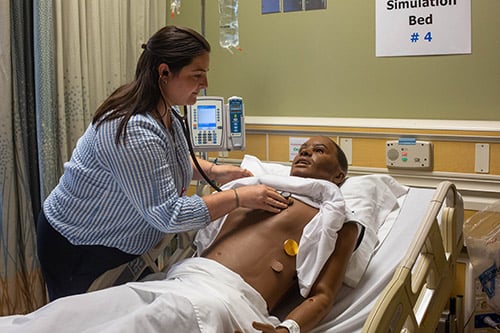Between two coasts, four universities, five employers, and 7-year-old twins, CU College of Nursing Assistant Professor Dr. Angela Pal, PhD, RN, ACNP-BC, certainly packed several lifetimes of learning and experience into the last 30 years.
A nurse who has covered myriad disciplines in the healthcare field, Pal was nominated as a Nightingale Nurse as an Educator with a focus on Innovation. She is now among the finalists for the Colorado Nightingale awards to be honored in an Aug. 13 ceremony presented by the Colorado Nurses Foundation.
Among other achievements, Pal is credited with bringing digital simulation into graduate education at CU College of Nursing at a critical point.
“Dr. Pal worked with a small faculty team to quickly implement an established digital simulation platform into the Clinical Nurse Specialist, Family Nurse Practitioner, and AG-APRN curriculum,” wrote CU Nursing Associate Professor Krista Estes, DNP, FNP-C, FNP in a nomination letter for Pal‘s Nightingale award. “In fact, 60 APRN (advanced practice registered nursing) students were able to graduate and enter the workforce Spring and Summer of 2020 due to her tireless efforts.”
Estes also referenced Pal’s leadership and mentorship in the effective integration of simulation programs as well as her international influence as a member of the Heart Disease Screening Team for Nepal, where she and her team provide education and compassionate care for impoverished communities in Nepal.
A whirlwind career with Mississippi roots
After earning her BSN from the University of Southern Mississippi in 1997, Pal accepted a job as a traveling nurse in a quest to see the world outside of her native state.
“My goal was to travel across the country, but I ended up staying in California for five years after my first assignment,” Pal says. “I fell in love with the Bay Area. It was truly life-changing for me professionally and personally, having grown up in Mississippi.”
While working at the Alameda County Medical Center in the Bay Area, Pal met her future husband, Jay Pal, MD, PhD, who was then a surgical resident. Working in an urban hospital rife with gun shootings and gang violence proved to be eye-opening and educational experience for her.
“We didn’t have a lot of resources, so we learned what we had to do to take care of patients in the intensive care unit,” Pal recalls.
After acquiring expertise in cardiology, neurosurgery, trauma, medical, surgical and ICU, Pal moved to North Carolina with her husband, who was completing his cardiac surgery fellowship. While working at Duke University Health System as a registered nurse, she earned her master's degree as an acute care nursing practitioner from Duke University.
“Being at Duke exposed me to research and so many questions about why and how we can make things better.” Pal says.
While serving as an acute care nurse practitioner in cardiothoracic surgery at the University of Texas Health Science Center in San Antonio, she earned her PhD in Nursing Science.
In her characteristic, fast-paced, multi-tasking fashion, she moved to Seattle with her husband (who accepted an assistant professor position at the University of Washington) and completed her dissertation one month before giving birth to twins.
Finding a home in academia
In 2015, Pal accepted a challenge at the University of Washington to help revitalize their acute care nurse practitioner program.
“I really engaged with students and continued my passion in acute care,” Pal says.
Pal continued to teach remotely at the University of Washington when she moved to Colorado with her husband, who joined the University of Colorado School of Medicine faculty as an associate professor in 2017.
Shortly after reaching out to Associate Professor Laura Rosenthal, DNP, ACNP, FAANP, in 2018, she found herself accepting a role as Assistant Director of Clinical Teaching and Specialty Director of the Adult Gerontology Acute Care Nurse Practitioner program (AGACNP). Pal was charged with helping grow the virtual simulation part of the program to reach distance learning students outside of Colorado.
Although Pal says she had a “suboptimal experience” with simulation throughout her own NP training, she saw potential to make simulation labs a more positive experience where students are free to make mistakes in a safe learning environment.
“My two goals in simulation were to improve confidence and ease the transition from bedside nurse to healthcare provider,” Pal says. When the pandemic hit and students lost access to real-life clinics, Pal and her team were able to help other faculty transition to the simulation model quickly. She added board-certified health simulation educator (CHSE) to her list of credentials and is an active participant in the Colorado Simulation Collaborative as well as an advocate and leader for simulation in graduate education – an area that was once reserved for undergraduates.
The virtual simulation model has proven to be so successful that when Pal’s husband returned to the University of Washington as a full-time professor during the pandemic, she opted to teach at CU Nursing remotely from Seattle.
Respected among students and peers
Colleagues from CU Nursing give Pal significant credit for helping the college keep students engaged through simulation throughout the pandemic.
“Angela’s energy, creativity, intelligence, and passion seem almost boundless to me,” says Associate Professor Fara Bowler, DNP, APRN, CHSE, senior director of the Experiential Learning Team at CU Nursing. “She helped to transform our simulation model with clear goals in mind to understand the methodology, design, and debriefing.”

CU Nursing student Allie Kraybill in a recent sim-lab. |
Students also greatly appreciate Pal’s expertise and mentoring approach.
“A big reason I chose CU Nursing was because of Dr. Pal,” says Allie Kraybill, a CU Nursing student who is working towards becoming a nurse practitioner specializing in acute care of the adult and geriatric patient. “Because she pushes us in the best way, she helps us see things that maybe we wouldn’t have seen for ourselves. Even when I was taking courses that she was not teaching, she checked in to make sure things were going well, and to see how she could help with the transition into grad school.”
Gratitude for mentors, students
As for being named a Nightingale Luminary, Pal says she’s “in awe” that her peers nominated her. She credits Bowler, Rosenthal, CU Nursing Professor of Clinical Teaching Mary Beth Makic, PhD, RNC, Krista Estes, DNP, FNP, and her husband and many others for imparting support and wisdom that she believes will ultimately benefit the CU Nursing graduate students -- whom she regards as the heroes and heroines of the future.
“One of the most satisfying things is seeing students succeed,” she says. “These students are stressed and working full-time in a pandemic. What keeps me going is the pride I see in these students when they pass their boards. Ultimately, they’re going to be my colleagues next door who are practicing, maybe even taking care of my family members.”


